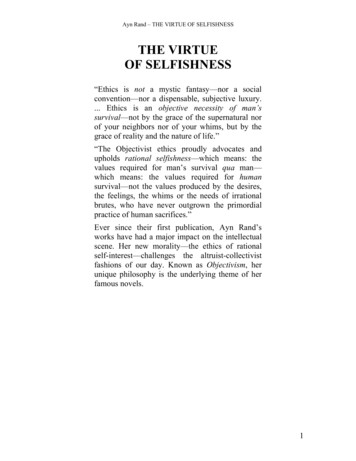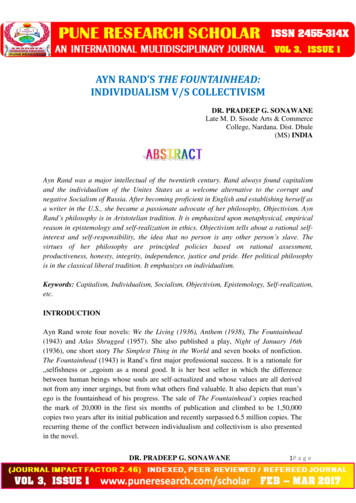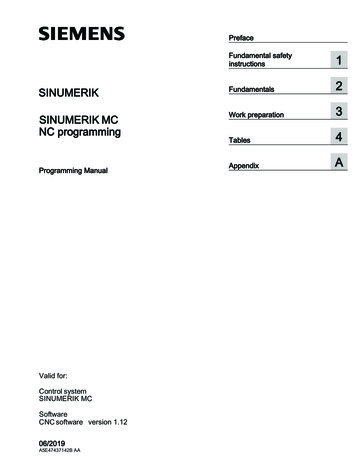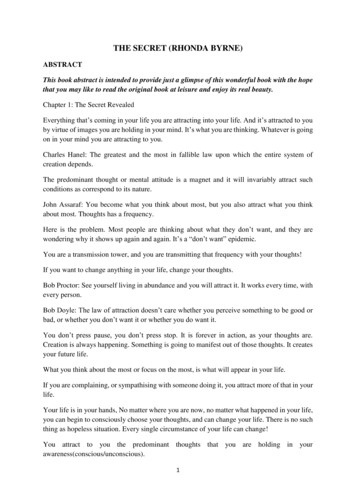
Transcription
Ayn Rand – THE VIRTUE OF SELFISHNESSTHE VIRTUEOF SELFISHNESS“Ethics is not a mystic fantasy—nor a socialconvention—nor a dispensable, subjective luxury. Ethics is an objective necessity of man’ssurvival—not by the grace of the supernatural norof your neighbors nor of your whims, but by thegrace of reality and the nature of life.”“The Objectivist ethics proudly advocates andupholds rational selfishness—which means: thevalues required for man’s survival qua man—which means: the values required for humansurvival—not the values produced by the desires,the feelings, the whims or the needs of irrationalbrutes, who have never outgrown the primordialpractice of human sacrifices.”Ever since their first publication, Ayn Rand’sworks have had a major impact on the intellectualscene. Her new morality—the ethics of rationalself-interest—challenges the altruist-collectivistfashions of our day. Known as Objectivism, herunique philosophy is the underlying theme of herfamous novels.1
Ayn Rand – THE VIRTUE OF SELFISHNESSTHEVIRTUEOFSELFISHNESSA New Concept of Egoismby Ayn RandWith Additional Articlesby Nathaniel BrandenA SIGNET BOOK2
Ayn Rand – THE VIRTUE OF SELFISHNESSSIGNETPublished by the Penguin GroupPenguin Books USA Inc., 375 Hudson Street,New York, New York 10014, U.S.A.Penguin Books Ltd, 27 Wrights Lane,London W8 5TZ, EnglandPenguin Books Australia Ltd, Ringwood,Victoria, AustraliaPenguin Books Canada Ltd, 10 Alcorn Avenue,Toronto, Ontario, Canada M4V 3B2Penguin Books (N.Z.) Ltd, 182-190 Wairau Road,Auckland 10, New ZealandPenguin Books Ltd, Registered Offices:Harmondsworth, Middlesex, EnglandPublished by Signet, an imprint of Dutton Signet,a division of Penguin Books USA Inc.39 38 37 36 35Copyright 1961, 1964 by Ayn RandCopyright 1962, 1963, 1964 byThe Objectivist Newsletter, Inc.All rights reservedThis book or any part thereof must not bereproduced in any form without the writtenpermission of the publisher.Permission requests for college ortextbook use should be addressed to theEstate of Ayn Rand, Box 177, Murray Hill Station,New York, NY 10157.Information about other books by Ayn Rand and her philosophy. Objectivism, may be obtained by writing to OBJECTIVISM, Box177, Murray Hill Station, New York, New York, 10157 USA.REGISTERED TRADEMARK—MARCA REGISTRADAPrinted in the United States of AmericaIf you purchased this book without a cover you should be aware that this book is stolen property. It was reported as “unsold anddestroyed” to the publisher and neither the author nor the publisher has received any payment for this “stripped book.”3
Ayn Rand – THE VIRTUE OF SELFISHNESSContentsContents. 4Introduction . 51. The Objectivist Ethics . 102. Mental Health versus Mysticism and Self-Sacrifice. 323. The Ethics of Emergencies . 394. The “Conflicts” of Men’s interests . 465. Isn’t Everyone Selfish?. 536. The Psychology of Pleasure . 577. Doesn’t Life Require Compromise?. 648. How Does One Lead a Rational Life in an irrational Society?. 679. The Cult of Moral Grayness . 7110. Collectivized Ethics. 7611. The Monument Builders. 8212. Man’s Rights . 8813. Collectivized “Rights”. 9614. The Nature of Government. 10215. Government Financing in a Free Society . 11016. The Divine Right of Stagnation. 11517. Racism . 12018. Counterfeit individualism . 12919. The Argument from intimidation . 1334
Ayn Rand – THE VIRTUE OF SELFISHNESSIntroductionThe title of this book may evoke the kind of question that I hear once in awhile: “Why do you use the word ‘selfishness’ to denote virtuous qualitiesof character, when that word antagonizes so many people to whom it doesnot mean the things you mean?”To those who ask it, my answer is: “For the reason that makes you afraidof it.”But there are others, who would not ask that question, sensing the moralcowardice it implies, yet who are unable to formulate my actual reason or toidentify the profound moral issue involved. It is to them that I will give amore explicit answer.It is not a mere semantic issue nor a matter of arbitrary choice. Themeaning ascribed in popular usage to the word “selfishness” is not merelywrong: it represents a devastating intellectual “package-deal,” which isresponsible, more than any other single factor, for the arrested moraldevelopment of mankind.In popular usage, the word “selfishness” is a synonym of evil; the image itconjures is of a murderous brute who tramples over piles of corpses toachieve his own ends, who cares for no living being and pursues nothing butthe gratification of the mindless whims of any immediate moment.Yet the exact meaning and dictionary definition of the word “selfishness”is: concern with one’s own interests.This concept does not include a moral evaluation; it does not tell uswhether concern with one’s own interests is good or evil; nor does it tell uswhat constitutes man’s actual interests. It is the task of ethics to answer suchquestions.The ethics of altruism has created the image of the brute, as its answer, inorder to make men accept two inhuman tenets: (a) that any concern withone’s own interests is evil, regardless of what these interests might be, and(b) that the brute’s activities are in fact to one’s own interest (which altruismenjoins man to renounce for the sake of his neighbors).For a view of the nature of altruism, its consequences and the enormity ofthe moral corruption it perpetrates, I shall refer you to Atlas Shrugged—or toany of today’s newspaper headlines. What concerns us here is altruism’sdefault in the field of ethical theory.5
Ayn Rand – THE VIRTUE OF SELFISHNESSThere are two moral questions which altruism lumps together into one“package-deal”: (1) What are values? (2) Who should be the beneficiary ofvalues? Altruism substitutes the second for the first; it evades the task ofdefining a code of moral values, thus leaving man, in fact, without moralguidance.Altruism declares that any action taken for the benefit of others is good,and any action taken for one’s own benefit is evil. Thus the beneficiary of anaction is the only criterion of moral value—and so long as that beneficiary isanybody other than oneself, anything goes.Hence the appalling immorality, the chronic injustice, the grotesquedouble standards, the insoluble conflicts and contradictions that havecharacterized human relationships and human societies throughout history,under all the variants of the altruist ethics.Observe the indecency of what passes for moral judgments today. Anindustrialist who produces a fortune, and a gangster who robs a bank areregarded as equally immoral, since they both sought wealth for their own“selfish” benefit. A young man who gives up his career in order to supporthis parents and never rises beyond the rank of grocery clerk is regarded asmorally superior to the young man who endures an excruciating struggle andachieves his personal ambition. A dictator is regarded as moral, since theunspeakable atrocities he committed were intended to benefit “the people,”not himself.Observe what this beneficiary-criterion of morality does to a man’s life.The first thing he learns is that morality is his enemy; he has nothing to gainfrom it, he can only lose; self-inflicted loss, self-inflicted pain and the gray,debilitating pall of an incomprehensible duty is all that he can expect. Hemay hope that others might occasionally sacrifice themselves for his benefit,as he grudgingly sacrifices himself for theirs, but he knows that therelationship will bring mutual resentment, not pleasure—and that, morally,their pursuit of values will be like an exchange of unwanted, unchosenChristmas presents, which neither is morally permitted to buy for himself.Apart from such times as he manages to perform some act of self-sacrifice,he possesses no moral significance: morality takes no cognizance of him andhas nothing to say to him for guidance in the crucial issues of his life; it isonly his own personal, private, “selfish” life and, as such, it is regardedeither as evil or, at best, amoral.Since nature does not provide man with an automatic form of survival,since he has to support his life by his own effort, the doctrine that concernwith one’s own interests is evil means that man’s desire to live is evil—thatman’s life, as such, is evil. No doctrine could be more evil than that.6
Ayn Rand – THE VIRTUE OF SELFISHNESSYet that is the meaning of altruism, implicit in such examples as theequation of an industrialist with a robber. There is a fundamental moraldifference between a man who sees his self-interest in production and a manwho sees it in robbery. The evil of a robber does not lie in the fact that hepursues his own interests, but in what he regards as to his own interest; notin the fact that he pursues his values, but in what he chose to value; not inthe fact that he wants to live, but in the fact that he wants to live on asubhuman level (see “The Objectivist Ethics”).If it is true that what I mean by “selfishness” is not what is meantconventionally, then this is one of the worst indictments of altruism: itmeans that altruism permits no concept of a self-respecting, self-supportingman—a man who supports his life by his own effort and neither sacrificeshimself nor others. It means that altruism permits no view of men except assacrificial animals and profiteers-on-sacrifice, as victims and parasites—thatit permits no concept of a benevolent co-existence among men—that itpermits no concept of justice.If you wonder about the reasons behind the ugly mixture of cynicism andguilt in which most men spend their lives, these are the reasons: cynicism,because they neither practice nor accept the altruist morality—guilt, becausethey dare not reject it.To rebel against so devastating an evil, one has to rebel against its basicpremise. To redeem both man and morality, it is the concept of “selfishness”that one has to redeem.The first step is to assert man’s right to a moral existence—that is: torecognize his need of a moral code to guide the course and the fulfillment ofhis own life.For a brief outline of the nature and the validation of a rational morality,see my lecture on “The Objectivist Ethics” which follows. The reasons whyman needs a moral code will tell you that the purpose of morality is to defineman’s proper values and interests, that concern with his own interests is theessence of a moral existence, and that man must be the beneficiary of hisown moral actions.Since all values have to be gained and/or kept by men’s actions, anybreach between actor and beneficiary necessitates an injustice: the sacrificeof some men to others, of the actors to the nonactors, of the moral to theimmoral. Nothing could ever justify such a breach, and no one ever has.The choice of the beneficiary of moral values is merely a preliminary orintroductory issue in the field of morality. It is not a substitute for moralitynor a criterion of moral value, as altruism has made it. Neither is it a moral7
Ayn Rand – THE VIRTUE OF SELFISHNESSprimary: it has to be derived from and validated by the fundamentalpremises of a moral system.The Objectivist ethics holds that the actor must always be the beneficiaryof his action and that man must act for his own rational self-interest. But hisright to do so is derived from his nature as man and from the function ofmoral values in human life—and, therefore, is applicable only in the contextof a rational, objectively demonstrated and validated code of moralprinciples which define and determine his actual self-interest. It is not alicense “to do as he pleases” and it is not applicable to the altruists’ image ofa “selfish” brute nor to any man motivated by irrational emotions, feelings,urges, wishes or whims.This is said as a warning against the kind of “Nietzschean egoists” who, infact, are a product of the altruist morality and represent the other side of thealtruist coin: the men who believe that any action, regardless of its nature, isgood if it is intended for one’s own benefit. Just as the satisfaction of theirrational desires of others is not a criterion of moral value, neither is thesatisfaction of one’s own irrational desires. Morality is not a contest ofwhims. (See Mr. Branden’s articles “Counterfeit Individualism” and “Isn’tEveryone Selfish?” which follow.)A similar type of error is committed by the man who declares that sinceman must be guided by his own independent judgment, any action hechooses to take is moral if he chooses it. One’s own independent judgment isthe means by which one must choose one’s actions, but it is not a moralcriterion nor a moral validation: only reference to a demonstrable principlecan validate one’s choices.Just as man cannot survive by any random means, but must discover andpractice the principles which his survival requires, so man’s self-interestcannot be determined by blind desires or random whims, but must bediscovered and achieved by the guidance of rational principles. This is whythe Objectivist ethics is a morality of rational self-interest—or of rationalselfishness.Since selfishness is “concern with one’s own interests,” the Objectivistethics uses that concept in its exact and purest sense. It is not a concept thatone can surrender to man’s enemies, nor to the unthinking misconceptions,distortions, prejudices and fears of the ignorant and the irrational. The attackon “selfishness” is an attack on man’s self-esteem; to surrender one, is tosurrender the other.Now a word about the material in this book. With the exception of thelecture on ethics, it is a collection of essays that have appeared in TheObjectivist Newsletter, a monthly journal of ideas, edited and published by8
Ayn Rand – THE VIRTUE OF SELFISHNESSNathaniel Branden and myself. The Newsletter deals with the application ofthe philosophy of Objectivism to the issues and problems of today’sculture—more specifically, with that intermediary level of intellectualconcern which lies between philosophical abstractions and the journalisticconcretes of day-by-day existence. Its purpose is to provide its readers with aconsistent philosophical frame of reference.This collection is not a systematic discussion of ethics, but a series ofessays on those ethical subjects which needed clarification, in today’scontext, or which had been most confused by altruism’s influence. You mayobserve that the titles of some of the essays are in the form of a question.These come from our “Intellectual Ammunition Department” that answersquestions sent in by our readers.—AYN RANDNew York, September 1964P.S. Nathaniel Branden is no longer associated with me, with myphilosophy or with The Objectivist (formerly The Objectivist Newsletter).—A. R.New York, November 19709
Ayn Rand – THE VIRTUE OF SELFISHNESS1. The Objectivist Ethicsby Ayn RandSince I am to speak on the Objectivist Ethics, I shall begin by quoting itsbest representative—John Galt, in Atlas Shrugged:“Through centuries of scourges and disasters, brought about by your codeof morality, you have cried that your code had been broken, that thescourges were punishment for breaking it, that men were too weak and tooselfish to spill all the blood it required. You damned man, you damnedexistence, you damned this earth, but never dared to question your code. .You went on crying that your code was noble, but human nature was notgood enough to practice it. And no one rose to ask the question: Good?—bywhat standard?“You wanted to know John Galt’s identity. I am the man who has askedthat question.“Yes, this is an age of moral crisis. . Your moral code has reached itsclimax, the blind alley at the end of its course. And if you wish to go onliving, what you now need is not to return to morality . but to discover it.”1What is morality, or ethics? It is a code of values to guide man’s choicesand actions—the choices and actions that determine the purpose and thecourse of his life. Ethics, as a science, deals with discovering and definingsuch a code.The first question that has to be answered, as a precondition of anyattempt to define, to judge or to accept any specific system of ethics, is: Whydoes man need a code of values?Let me stress this. The first question is not: What particular code of valuesshould man accept? The first question is: Does man need values at all—andwhy?Is the concept of value, of “good or evil” an arbitrary human invention,unrelated to, underived from and unsupported by any facts of reality—or is itbased on a metaphysical fact, on an unalterable condition of man’sexistence? (I use the word “metaphysical” to mean: that which pertains toreality, to the nature of things, to existence.) Does an arbitrary humanconvention, a mere custom, decree that man must guide his actions by a setof principles—or is there a fact of reality that demands it? Is ethics the1Ayn Rand, Atlas Shrugged, New York: Random House, 1957; New American Library, 1959.Paper delivered by Ayn Rand at the University of Wisconsin Symposium on “Ethics in Our Time” inMadison, Wisconsin, on February 9, 1961.10
Ayn Rand – THE VIRTUE OF SELFISHNESSprovince of whims: of personal emotions, social edicts and mysticrevelations—or is it the province of reason? Is ethics a subjective luxury—or an objective necessity?In the sorry record of the history of mankind’s ethics—with a few rare,and unsuccessful, exceptions—moralists have regarded ethics as theprovince of whims, that is: of the irrational. Some of them did so explicitly,by intention—others implicitly, by default. A “whim” is a desire experienced by a person who does not know and does not care to discover itscause.No philosopher has given a rational, objectively demonstrable, scientificanswer to the question of why man needs a code of values. So long as thatquestion remained unanswered, no rational, scientific, objective code ofethics could be discovered or defined. The greatest of all philosophers,Aristotle, did not regard ethics as an exact science; he based his ethicalsystem on observations of what the noble and wise men of his time chose todo, leaving unanswered the questions of: why they chose to do it and why heevaluated them as noble and wise.Most philosophers took the existence of ethics for granted, as the given, asa historical fact, and were not concerned with discovering its metaphysicalcause or objective validation. Many of them attempted to break thetraditional monopoly of mysticism in the field of ethics and, allegedly, todefine a rational, scientific, nonreligious morality. But their attemptsconsisted of trying to justify them on social grounds, merely substitutingsociety for God.The avowed mystics held the arbitrary, unaccountable “will of God” asthe standard of the good and as the validation of their ethics. The neomysticsreplaced it with “the good of society,” thus collapsing into the circularity ofa definition such as “the standard of the good is that which is good forsociety.” This meant, in logic—and, today, in worldwide practice—that“society” stands above any principles of ethics, since it is the source,standard and criterion of ethics, since “the good” is whatever it wills,whatever it happens to assert as its own welfare and pleasure. This meantthat “society” may do anything it pleases, since “the good” is whatever itchooses to do because it chooses to do it. And—since there is no such entityas “society,” since society is only a number of individual men—this meantthat some men (the majority or any gang that claims to be its spokesman) areethically entitled to pursue any whims (or any atrocities) they desire topursue, while other men are ethically obliged to spend their lives in theservice of that gang’s desires.11
Ayn Rand – THE VIRTUE OF SELFISHNESSThis could hardly be called rational, yet most philosophers have nowdecided to declare that reason has failed, that ethics is outside the power ofreason, that no rational ethics can ever be defined, and that in the field ofethics—in the choice of his values, of his actions, of his pursuits, of his life’sgoals—man must be guided by something other than reason. By eeling—taste—urge—wish—whim. Today, as in the past, most philosophers agree that the ultimatestandard of ethics is whim (they call it “arbitrary postulate” or “subjectivechoice” or “emotional commitment”)—and the battle is only over thequestion or whose whim: one’s own or society’s or the dictator’s or God’s.Whatever else they may disagree about, today’s moralists agree that ethics isa subjective issue and that the three things barred from its field are: reason—mind—reality.If you wonder why the world is now collapsing to a lower and ever lowerrung of hell, this is the reason.If you want to save civilization, it is this premise of modern ethics—andof all ethical history—that you must challenge.To challenge the basic premise of any discipline, one must begin at thebeginning. In ethics, one must begin by asking: What are values? Why doesman need them?“Value” is that which one acts to gain and/or keep. The concept “value” isnot a primary; it presupposes an answer to the question: of value to whomand for what? It presupposes an entity capable of acting to achieve a goal inthe face of an alternative. Where no alternative exists, no goals and novalues are possible.I quote from Galt’s speech: “There is only one fundamental alternative inthe universe: existence or nonexistence—and it pertains to a single class ofentities: to living organisms. The existence of inanimate matter isunconditional, the existence of life is not: it depends on a specific course ofaction. Matter is indestructible, it changes its forms, but it cannot cease toexist. It is only a living organism that faces a constant alternative: the issueof life or death. Life is a process of self-sustaining and self-generated action.If an organism fails in that action, it dies; its chemical elements remain, butits life goes out of existence. It is only the concept of ‘Life’ that makes theconcept of ‘Value’ possible. It is only to a living entity that things can begood or evil.”To make this point fully clear, try to imagine an immortal, indestructiblerobot, an entity which moves and acts, but which cannot be affected byanything, which cannot be changed in any respect, which cannot bedamaged, injured or destroyed. Such an entity would not be able to have any12
Ayn Rand – THE VIRTUE OF SELFISHNESSvalues; it would have nothing to gain or to lose; it could not regard anythingas for or against it, as serving or threatening its welfare, as fulfilling orfrustrating its interests. It could have no interests and no goals.Only a living entity can have goals or can originate them. And it is only aliving organism that has the capacity for self-generated, goal-directed action.On the physical level, the functions of all living organisms, from thesimplest to the most complex—from the nutritive function in the single cellof an amoeba to the blood circulation in the body of a man—are actionsgenerated by the organism itself and directed to a single goal: themaintenance of the organism’s life.2An organism’s life depends on two factors: the material or fuel which itneeds from the outside, from its physical background, and the action of itsown body, the action of using that fuel properly. What standard determineswhat is proper in this context? The standard is the organism’s life, or: thatwhich is required for the organism’s survival.No choice is open to an organism in this issue: that which is required forits survival is determined by its nature, by the kind of entity it is. Manyvariations, many forms of adaptation to its background are possible to anorganism, including the possibility of existing for a while in a crippled,disabled or diseased condition, but the fundamental alternative of itsexistence remains the same: if an organism fails in the basic functionsrequired by its nature—if an amoeba’s protoplasm stops assimilating food,or if a man’s heart stops beating—the organism dies. In a fundamental sense,stillness is the antithesis of life. Life can be kept in existence only by aconstant process of self-sustaining action. The goal of that action, theultimate value which, to be kept, must be gained through its every moment,is the organism’s life.An ultimate value is that final goal or end to which all lesser goals are themeans—and it sets the standard by which all lesser goals are evaluated. Anorganism’s life is its standard of value: that which furthers its life is thegood, that which threatens it is the evil.Without an ultimate goal or end, there can be no lesser goals or means: aseries of means going off into an infinite progression toward a nonexistentend is a metaphysical and epistemological impossibility. It is only anultimate goal, an end in itself, that makes the existence of values possible.2When applied to physical phenomena, such as the automatic functions of an organism, the term “goaldirected” is not to be taken to mean “purposive” (a concept applicable only to the actions of a consciousness) and is not to imply the existence of any teleological principle operating in insentient nature. Iuse the term “goal-directed,” in this context, to designate the fact that the automatic functions of livingorganisms are actions whose nature is such that they result in the preservation of an organism’s life.13
Ayn Rand – THE VIRTUE OF SELFISHNESSMetaphysically, life is the only phenomenon that is an end in itself: a valuegained and kept by a constant process of action. Epistemologically, theconcept of “value” is genetically dependent upon and derived from theantecedent concept of “life.” To speak of “value” as apart from “life” isworse than a contradiction in terms. “It is only the concept of ‘Life’ thatmakes the concept of ‘Value’ possible.”In answer to those philosophers who claim that no relation can beestablished between ultimate ends or values and the facts of reality, let mestress that the fact that living entities exist and function necessitates theexistence of values and of an ultimate value which for any given livingentity is its own life. Thus the validation of value judgments is to beachieved by reference to the facts of reality. The fact that a living entity is,determines what it ought to do. So much for the issue of the relation between“is” and “ought.”Now in what manner does a human being discover the concept of“value”? By what means does he first become aware of the issue of “good orevil” in its simplest form? By means of the physical sensations of pleasureor pain. Just as sensations are the first step of the development of a humanconsciousness in the realm of cognition, so they are its first step in the realmof evaluation.The capacity to experience pleasure or pain is innate in a man’s body; it ispart of his nature, part of the kind of entity he is. He has no choice about it,and he has no choice about the standard that determines what will make himexperience the physical sensation of pleasure or of pain. What is thatstandard? His life.The pleasure-pain mechanism in the body of man—and in the bodies ofall the living organisms that possess the faculty of consciousness—serves asan automatic guardian of the organism’s life. The physical sensation ofpleasure is a signal indicating that the organism is pursuing the right courseof action. The physical sensation of pain is a warning signal of danger,indicating that the organism is pursuing the wrong course of action, thatsomething is impairing the proper function of its body, which requires actionto correct it. The best
the moral corruption it perpetrates, I shall refer you to Atlas Shrugged—or to any of today’s newspaper headlines. What concerns us here is altruism’s default in the field of ethical theory. Ayn Rand – THE VIRTUE OF SELFISHNESS 6 There are t










